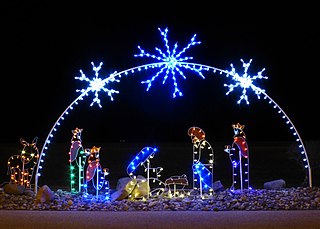 W
WChristmas is an annual festival commemorating the birth of Jesus Christ, observed primarily on December 25 as a religious and cultural celebration by billions of people around the world. A feast central to the Christian liturgical year, it is preceded by the season of Advent or the Nativity Fast and initiates the season of Christmastide, which historically in the West lasts twelve days and culminates on Twelfth Night. Christmas Day is a public holiday in many of the world's nations, is celebrated religiously by a majority of Christians, as well as culturally by many non-Christians, and forms an integral part of the holiday season centered around it.
 W
WDay of the Restoration of Latvian Independence is a Latvian national holiday and event, being celebrated annually on 4 May. It marks, like the other Baltic republics, the restoration of the Latvian Republic by official declaration by the Supreme Soviet of the Latvian SSR on May 4, 1990. The country would not however, have complete independence, only achieving full independence from the Soviet Union on December 25, 1991.
 W
WThe Christian festival of Easter is celebrated in Latvia as Lieldienas. Lieldienas enters Holy Week with Palm Sunday, Maundy Thursday, Good Friday and Holy Saturday, but Sunday will mark first Lieldienas. Second Lieldienas is on Monday of the following week. Each day has a special significance. Also, many pagan elements of celebrating Lieldienas have become a tradition.
 W
WEaster Monday is the day after Easter Sunday and is a public holiday in some countries. It is the second day of Eastertide. In Western Christianity, it is also the second day of the Octave of Easter, and in Eastern Christianity, it is also the second day of Bright Week.
 W
WGood Friday is a Christian holiday commemorating the crucifixion of Jesus and his death at Calvary. It is observed during Holy Week as part of the Paschal Triduum on the Friday preceding Easter Sunday. It is also known as Holy Friday, Great Friday, Great and Holy Friday, and Black Friday.
 W
WJāņi is an annual Latvian festival celebrating the summer solstice. Although astronomically the solstice falls on 21 or 22 June, the public holidays—Līgo Day and Jāņi Day—are on 23 and 24 June. The day before Jāņi is known as Līgosvētki.
 W
WJurģi or Ūsiņš Day is an ancient Latvian spring festival which coincides with the Christian Church's day of feast in honor of Saint George on April 23rd. After the holidays, it signified the beginning of pieguļa and shepherding. According to a solar calendar, Jurģi day marks the midpoint between the spring solstice (Lieldienas) and summer solstice (Jāņi) and, according to a Julian calendar, it is celebrated on 6 May.
 W
WLāčplēsis Day is a memorial day for soldiers who fought for the independence of Latvia. It is celebrated on November 11, marking the victory over the West Russian Volunteer Army – a joint Russian-German volunteer force led by the warlord Pavel Bermondt-Avalov – at the 1919 Battle of Riga during the Latvian War of Independence.
 W
WMārtiņi or Mārtiņdiena is an ancient Latvian winter welcoming holiday, when the time of pieguļa and shepherding came to an end. According to a solar calendar, Mārtiņdiena marks the midpoint between the autumnal equinox (Miķeļi) and winter solstice (Ziemassvētki), and is celebrated in the middle of November. Mārtiņi ended Veļu laiks and started Ledus laiks, when the swamp became passable and raids of armed men sitting on horses were expected.
 W
WProclamation Day of the Republic of Latvia is celebrated annually on 18 November. It marks the anniversary of the Proclamation of Independence of Latvia by the People's Council of Latvia in 1918.